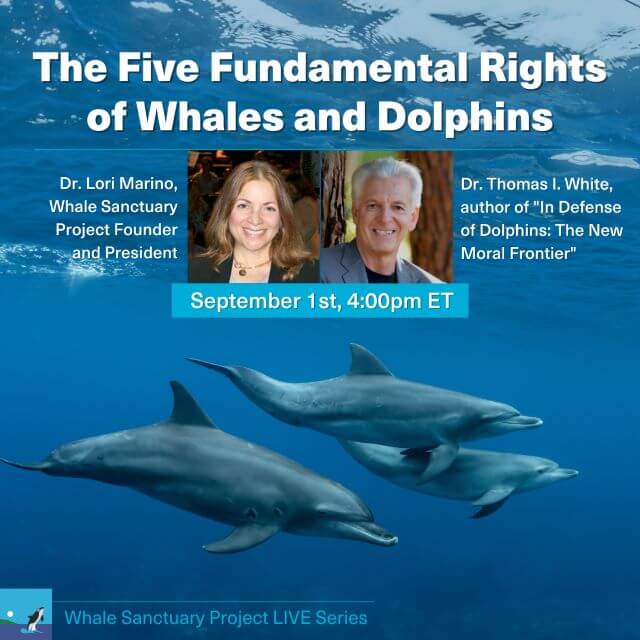
- This event has passed.
The Five Fundamental Rights of Whales and Dolphins
September 1, 2022 @ 4:00 PM - 5:00 PM EDT

Register here for this special webinar event.
We humans are self-aware beings who share strong emotional and social bonds with others, live according to cultural traditions, and have a sense of our life in time, remembering the past and planning for the future. As such, we consider ourselves to be “persons” with certain fundamental natural and moral rights.
But many other animals possess those same characteristics – in particular cetaceans (whales, dolphins and porpoises).
In this conversation, Dr. Lori Marino and Dr. Thomas I. White, author of In Defense of Dolphins: The New Moral Frontier, discuss five fundamental natural and moral rights of cetaceans:
- The right to life and bodily integrity (not to be subjected to invasive treatment);
- The right to bodily freedom and residence within their natural environment (not to be subjected to captivity or servitude);
- The right not to be owned or to be the property of any state, corporation, human group or individual;
- The right to protection of their natural environment;
- And the right to protection of their culture.
As humans, we claim these natural rights – often referred to as inalienable rights – by virtue of the simple fact that we are human. Unlike legal rights, we say they do not depend on governments and their laws. They would exist even if the government didn’t exist.
To what extent, then, do other animals have certain inalienable rights?
In this webinar Drs. Marino and White explore these rights and how they can be summed up in the most fundamental of all rights: the right to flourish.
Register in advance for this webinar:
https://us02web.zoom.us/webinar/register/WN_i_fx5havSCqbPV9kX-Iplg
Thursday, September 1st, 4–5 pm Eastern Daylight Time (8-9pm UTC)
About Lori’s guest: Thomas I. White, Ph.D.
 The main focus of Tom White’s research is the philosophical and ethical implications of scientific research on whales and dolphins. He argues that such practices as the captivity of dolphins and orcas, the deaths and injuries of dolphins in connection with hunting and fishing practices, and attempts to bring back commercial whaling are all ethically indefensible.
The main focus of Tom White’s research is the philosophical and ethical implications of scientific research on whales and dolphins. He argues that such practices as the captivity of dolphins and orcas, the deaths and injuries of dolphins in connection with hunting and fishing practices, and attempts to bring back commercial whaling are all ethically indefensible.
Professor White is the author of six books and numerous articles on topics ranging from contemporary applied ethics to sixteenth-century renaissance humanism.
He served as U.S. Ambassador to the United Nation’s 2007/8 Year of the Dolphin Program, and he is a Fellow of the Oxford Centre for Animal Ethics, a member of the Advisory Committee to the Kimmela Center for Animal Advocacy, and a Scientific Advisor to the Wild Dolphin Project.